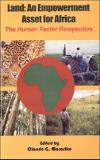| dc.contributor.author | Mapara, Jacob | |
| dc.contributor.author | Mpofu-Hamadziripi, N. | |
| dc.date.accessioned | 2016-04-22T14:07:30Z | |
| dc.date.available | 2016-04-22T14:07:30Z | |
| dc.date.issued | 2014 | |
| dc.identifier.citation | Mapara, J. and Mpofu-Hamadziripi, N. (2014) Language, indigenous knowledge and survival strategies. In: Mararike, C.G. (ed.) Land: an empowerment asset for Africa: the human factor perspective. Harare: UZ Publication, pp. 166-182. | en |
| dc.identifier.isbn | 978-1-77920-110-2 | |
| dc.identifier.uri | https://opendocs.ids.ac.uk/opendocs/handle/20.500.12413/11346 | |
| dc.description | A position paper on the importance of indigenous knowledge to a nation's survival and development. | en |
| dc.description.abstract | No nation has ever developed using a foreign language. The use of such a language has limitations. Similarly, dreams never come to a person other than in his or her mother tongue. It is in this light that this chapter seeks to foreground the nexus between language, indigenous knowledge and sustainable livelihoods. Besides being a communicative tool, language can be used to express ideas. It is also a means of carrying culture and passing it inter-generationally. Without language therefore there is no cultural continuity and the inverse is also true as regards culture and language. Part of the culture that language transmits is indigenous knowledge. Indigenous knowledge, as a cultural good, helps to preserve language. It is therefore common knowledge that to speak a language is' as well to live a certain type of language (Nyota and Mapara 2007: 12). Nyota and Mapara (2007) point out that practices linked to indigenous knowledge systems (IKSs) include language. These have ensured that people live in a sustainable manner in an environment that they have long realised has finite resources, resources that they believe were bequeathed to them by their ancestral spirits. They will, in turn, have to bequeath to future generations. This belief and acceptance that have led to the putting in place of taboos and other practices, are imparted through language use. The following discussion attempts to highlight the nexus that strings together language, IKSs and sustainable livelihoods. | en |
| dc.language.iso | en | en |
| dc.publisher | University of Zimbabwe (UZ) Publications | en |
| dc.rights.uri | http://creativecommons.org/licenses/by-nc-nd/3.0/ | en |
| dc.subject | Development Policy | en |
| dc.subject | Education | en |
| dc.subject | Science and Society | en |
| dc.title | Language, indigenous knowledge and survival strategies | en |
| dc.type | Book chapter | en |
| dc.rights.holder | University of Zimbabwe (UZ) | en |


